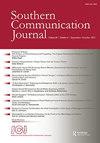(Eco)horror of Masculinity: Confronting Abject Nature in the Films of Robert Eggers
IF 0.8
Q3 COMMUNICATION
引用次数: 0
Abstract
ABSTRACT This essay argues that Robert Egger’s films, The Witch and The Lighthouse deconstructs gender relations and their effects on the environment. I illustrate how the films construct masculinity as perpetually in crisis and as a struggle for more accumulation, while the feminine is perceived as monstrous and abject. Both films, I argue, provide a visceral encounter with human’s own connections to nature and the damage that occurs when we deny that dependence. My analysis takes on an intersectional ecofeminist perspective informed by the concepts of the abject and monstrous-feminine, suggesting that these terms can be useful in illustrating and interpreting an affective confrontation with oppressive dualisms.(生态)男子气概的恐怖:在罗伯特·埃格斯的电影中面对卑鄙的自然
本文认为罗伯特·艾格的电影《女巫》和《灯塔》解构了两性关系及其对环境的影响。我阐释了电影是如何将男性气质构建为永远处于危机之中,为更多的积累而奋斗,而女性气质则被视为可怕和卑贱。我认为,这两部电影都展现了人类与自然之间发自内心的联系,以及当我们否认这种依赖时所造成的伤害。我的分析采用了一种交叉的生态女性主义观点,这种观点受到了卑鄙和可怕的女性概念的影响,表明这些术语可以用来说明和解释与压迫性二元论的情感对抗。
本文章由计算机程序翻译,如有差异,请以英文原文为准。
求助全文
约1分钟内获得全文
求助全文

 求助内容:
求助内容: 应助结果提醒方式:
应助结果提醒方式:


